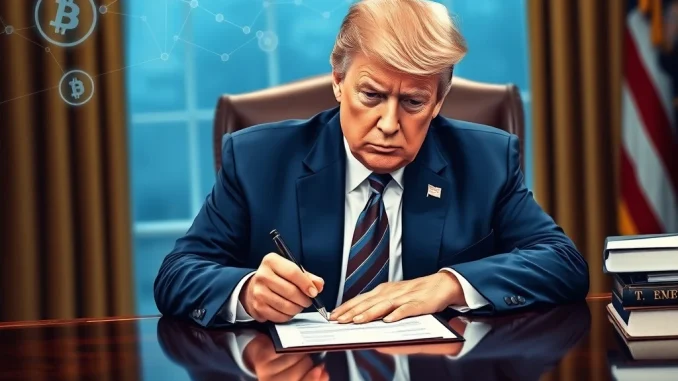
A seismic announcement has just rippled through the cryptocurrency world. White House official Bo Hines confirmed on X that President Trump is set to sign the **GENIUS Act** into law this afternoon. This legislation is not just another bill; it’s poised to be a monumental step in **US crypto regulation**, with profound implications for the future of digital assets and the global financial landscape. For anyone invested in the blockchain space, understanding the nuances of this act is crucial.
What Exactly is the GENIUS Act?
The **GENIUS Act**, or the ‘Generating Economic New Ideas and Unlocking Stability Act,’ has been the subject of much speculation and anticipation within the digital finance community. While the full text is still emerging, the core objectives, as outlined by the administration, are clear and ambitious:
- Supporting Dollar Dominance: The act aims to solidify the U.S. dollar’s position as the leading global currency, even in the burgeoning digital economy. This involves creating a clear framework for dollar-backed stablecoins and other digital representations of the dollar.
- Fostering Innovation in Digital Finance: Beyond just regulation, the GENIUS Act seeks to provide a conducive environment for technological advancements in blockchain, cryptocurrencies, and other distributed ledger technologies. It’s about nurturing growth, not stifling it.
- Establishing Regulatory Clarity: One of the biggest hurdles for crypto businesses in the U.S. has been the lack of a unified regulatory approach. The GENIUS Act is expected to provide much-needed clarity, defining roles for various agencies and establishing consistent rules of the road.
This legislative move represents a significant shift from previous, more fragmented approaches to digital asset oversight. It signals a proactive stance from the U.S. government to embrace, rather than resist, the digital revolution.
Why is US Crypto Regulation So Important Now?
The cryptocurrency market has matured significantly, evolving from a niche interest to a multi-trillion-dollar industry. With this growth comes an increasing need for clear, comprehensive regulation. Historically, the U.S. has been criticized for its piecemeal approach, leading to regulatory arbitrage and uncertainty for businesses and investors alike. The **GENIUS Act** aims to address these concerns head-on.
Consider the current landscape:
| Aspect | Pre-GENIUS Act Landscape | Potential Post-GENIUS Act Impact |
|---|---|---|
| Regulatory Clarity | Fragmented, agency-specific, inconsistent. | Unified framework, clearer definitions for digital assets. |
| Innovation | Hindered by uncertainty, ‘brain drain’ of talent. | Encouraged by legal certainty, attracting investment. |
| Consumer Protection | Patchy, reactive to crises. | Proactive measures, robust safeguards. |
| Global Competitiveness | U.S. lagging behind more crypto-friendly nations. | U.S. reasserting leadership in digital assets. |
The act’s signing signals a recognition that the U.S. cannot afford to be left behind in the global race for **digital finance innovation**. By providing a stable and predictable environment, the GENIUS Act could unlock significant economic potential.
How Will This Act Foster Digital Finance Innovation?
One of the primary goals of the **GENIUS Act** is to unleash the full potential of **digital finance innovation** within the United States. This goes beyond simply regulating existing cryptocurrencies; it’s about creating a fertile ground for new technologies, business models, and applications that leverage blockchain and other distributed ledger technologies.
Key areas where innovation could flourish include:
- Stablecoin Development: With clear rules, stablecoin issuers can operate with greater confidence, leading to more robust, transparent, and widely adopted digital dollars. This could facilitate faster, cheaper international payments and new financial products.
- Decentralized Finance (DeFi): While still nascent, DeFi platforms could benefit from a framework that distinguishes between truly decentralized protocols and centralized entities masquerading as such, allowing legitimate innovation to thrive without unnecessary burdens.
- Tokenization of Real-World Assets: The ability to represent traditional assets like real estate, art, or commodities on a blockchain could be streamlined, opening up new avenues for investment and liquidity.
- Blockchain-as-a-Service (BaaS): Companies offering blockchain infrastructure and solutions could find a more welcoming regulatory landscape, encouraging broader enterprise adoption.
The act is expected to provide regulatory sandboxes or innovation hubs, allowing companies to test new technologies under supervision without immediate, heavy compliance burdens. This ‘test-and-learn’ approach is vital for cutting-edge innovation.
What Does This Mean for Dollar Dominance in Crypto?
The concept of **dollar dominance in crypto** refers to the U.S. dollar’s enduring role as the world’s reserve currency, even as digital assets gain traction. Stablecoins, which are cryptocurrencies pegged to the value of fiat currencies like the U.S. dollar, play a critical role here. Currently, the vast majority of stablecoin market capitalization is tied to the U.S. dollar (e.g., USDT, USDC).
The **GENIUS Act** aims to:
- Reinforce Stablecoin Integrity: By establishing clear rules for stablecoin reserves, auditing, and issuance, the act seeks to ensure that dollar-backed stablecoins are truly ‘stable’ and trustworthy. This builds confidence in their use and reduces systemic risk.
- Prevent ‘De-Dollarization’: Some fear that the rise of digital currencies, especially central bank digital currencies (CBDCs) from other nations, could erode the dollar’s global standing. By proactively regulating dollar-backed stablecoins and fostering innovation, the U.S. aims to ensure the dollar remains central to global digital transactions.
- Promote U.S. Financial Leadership: By setting standards for digital assets, the U.S. can influence global norms and best practices, ensuring its financial system remains at the forefront of the digital age.
This strategic move is about ensuring that as the world moves towards a more digital economy, the U.S. dollar remains the anchor of global finance, providing stability and liquidity across borders.
How Will This Trump Crypto Law Impact Investors and Businesses?
The signing of the **Trump crypto law**, the GENIUS Act, will undoubtedly have a multifaceted impact on both individual investors and cryptocurrency businesses. While the full details will unfold post-signing, here are some anticipated effects:
For Investors:
- Increased Confidence: Greater regulatory clarity often leads to increased institutional and retail investor confidence. Knowing that assets are operating within a defined legal framework can reduce perceived risks.
- Broader Adoption: As regulatory hurdles are lowered, more traditional financial institutions may enter the crypto space, leading to new investment products and easier access for the general public.
- Enhanced Protections: The act is expected to include provisions for consumer and investor protection, potentially leading to safer platforms and clearer disclosure requirements.
- Potential Market Volatility: While long-term positive, the initial implementation of new regulations can sometimes lead to short-term market adjustments as businesses adapt.
For Businesses:
- Regulatory Certainty: This is perhaps the biggest win. Companies will have a clearer understanding of what is expected of them, reducing legal ambiguities and compliance costs in the long run.
- Operational Streamlining: A unified regulatory approach could simplify licensing and operational requirements across states and federal agencies.
- Access to Capital: With greater certainty, venture capitalists and traditional investors may be more willing to fund crypto and blockchain startups in the U.S.
- Increased Competition: As the market becomes more regulated and attractive, new players may enter, intensifying competition among existing firms.
This legislation aims to make the U.S. a more attractive hub for crypto businesses, potentially reversing the trend of companies seeking friendlier jurisdictions abroad.
Challenges and the Road Ahead
While the **GENIUS Act** is a significant step, its implementation will not be without challenges. Crafting regulations for a rapidly evolving technological landscape is complex. Key considerations include:
- Defining ‘Decentralization’: A persistent challenge in crypto regulation is how to regulate truly decentralized protocols without stifling their core innovation. The act will need to draw clear lines.
- Inter-Agency Coordination: Even with a new law, ensuring seamless coordination between the SEC, CFTC, Treasury, and other relevant bodies will be crucial for effective enforcement.
- Global Harmonization: As other countries develop their own crypto frameworks, the U.S. will need to ensure its regulations can integrate with international standards to avoid creating isolated markets.
- Technological Neutrality: The law must be flexible enough to adapt to future technological advancements without becoming obsolete.
The signing is just the beginning. The real work will involve the detailed rulemaking process by various agencies, which will further shape the practical impact of the GENIUS Act.
Conclusion: A New Chapter for Digital Assets
President Trump’s signing of the **GENIUS Act** marks a pivotal moment for the cryptocurrency and blockchain industry in the United States. This legislation, aimed at solidifying **dollar dominance in crypto** and fostering **digital finance innovation**, promises to bring much-needed clarity and a forward-looking framework to **US crypto regulation**. While challenges remain in its implementation, the act signals a clear intent for the U.S. to lead, rather than follow, in the global digital asset space. For investors and businesses, it heralds an era of greater certainty and potential growth, truly making this a landmark **Trump crypto law** that could reshape the financial future.
Frequently Asked Questions (FAQs)
Q1: What is the primary goal of the GENIUS Act?
A1: The GENIUS Act primarily aims to establish a clear regulatory framework for digital assets in the U.S., with specific goals of supporting the U.S. dollar’s dominance in the digital economy and fostering innovation within the digital finance sector.
Q2: How will the GENIUS Act impact stablecoins?
A2: The act is expected to introduce clear rules for stablecoin issuance, reserves, and auditing, enhancing their integrity and promoting their wider adoption as a secure digital representation of the U.S. dollar.
Q3: Is this act expected to increase or decrease innovation in the crypto space?
A3: The GENIUS Act is specifically designed to foster digital finance innovation by providing regulatory certainty and potentially creating innovation-friendly environments like sandboxes, which should encourage growth and development in the sector.
Q4: What does ‘dollar dominance in crypto’ mean, and how does the GENIUS Act support it?
A4: Dollar dominance in crypto refers to the U.S. dollar maintaining its leading global currency status within the digital asset ecosystem. The GENIUS Act supports this by regulating dollar-backed stablecoins and ensuring the U.S. remains a leader in digital financial standards.
Q5: How will the GENIUS Act affect average crypto investors?
A5: Average crypto investors may benefit from increased market confidence, enhanced consumer protections, and potentially broader access to regulated crypto products and services as more traditional financial institutions enter the space.
Q6: When will the full details and implications of the GENIUS Act be clear?
A6: While the act is being signed, the full details and practical implications will become clearer as various regulatory agencies proceed with the rulemaking process to implement the law’s provisions. This will happen over the coming months.



